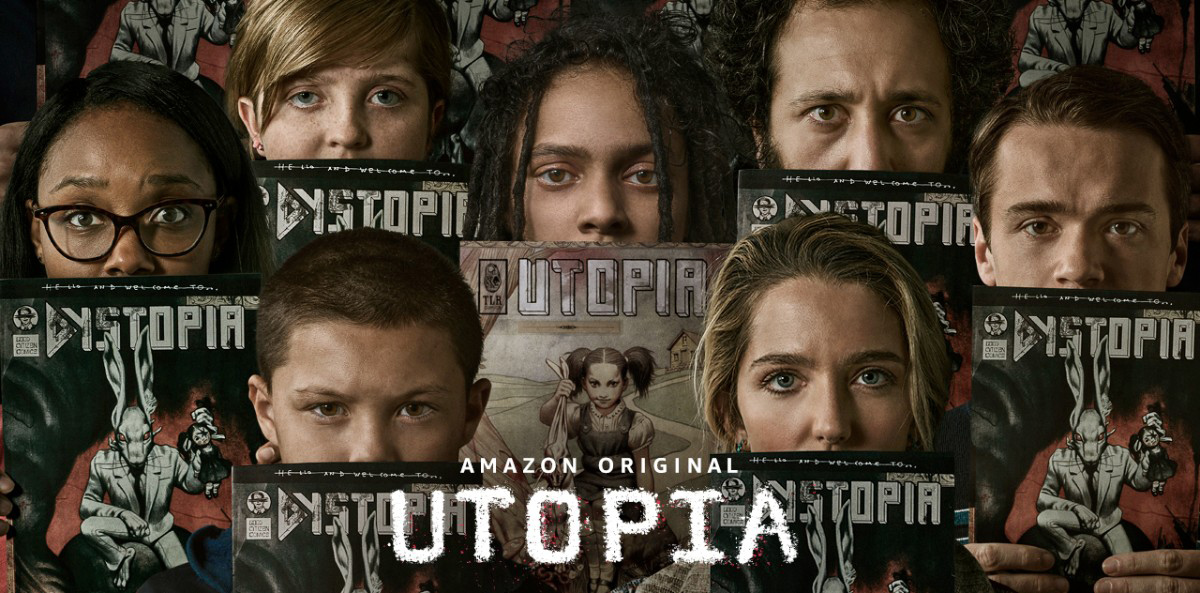What did you do today to earn your place in this crowded world?
Utopia, one of Amazon Prime’s latest original series, is a bleak, dark comedy reminiscent of another successful Amazon production, The Boys. It’s about a group of friends determined to buy the only manuscript of Utopia, the final, unreleased issue in a comic book series called Dystopia. The friends have researched Dystopia for years, discovering that it predicts global pandemics and the number of deaths caused by them: they believe that Utopia will be a blueprint for the end of the world.
The show has received multiple mixed reviews, although a large number seem to be issued because of the lackluster adaptation from its original 2013 British version. Though I myself am unfamiliar with its original rendition, I managed to enjoy everything I saw on screen… until the end of episode two.
The Dystopia comic book series features a little girl named Jessica Hyde who is searching for her father — the man responsible for making the MERS and Ebola viruses, in the comics — who’s being held against his will. At the end of episode one of Utopia, we learn that Jessica Hyde isn’t just a comic book character — she’s a real person who’s now grown into a young woman, still searching for her father and evading the people responsible for the deaths that ripple through the comic book convention where the other characters are hoping to win the manuscript. At the end of episode two, she tracks down the group of friends in order to use their help in finding Utopia, then brutally murders one of them in cold blood.
Gillian Flynn, the showrunner of this adaptation, is a masterful writer of women: cruel women, victimized women, women who are multidimensional and feel like they’re drawn from reality, and women from the farthest reaches of humanity. Her most popular works are Gone Girl and Sharp Objects, but Utopia is her first TV project that didn’t reach an audience book-first. Flynn has proven time and again that she knows how to craft a female villain and even make the reader sympathetic to her intentions.
The issue is that Jessica isn’t a developed or sympathetic character at this point given her minimal screen time: she’s violent, dismissive of all human life, and determined to work toward her goals only, everyone else be damned. Meanwhile, Sam — her victim — demonstrated compassion, intelligence, leadership, and by episode two was arguably the most developed character out of her group of friends. Her sudden murder at the hands of Jessica completely deteriorates the audience’s ability to trust who are meant to be the heroes of the story.
The rest of the friend group are just gutless followers clinging to the violent murderer of their friend, hoping that the other violent murderers chasing them down won’t kill them first. Flynn’s decision to fridge Sam is explained in her interview with the Wrap, where she clarified that Sam was created to die in order for Jessica to flourish into a leader and keep the audience unsettled, but the execution (literally) is a complete travesty. Flynn’s intentions failed to translate effectively on screen — Sam was murdered while protecting her friend, and she was murdered because she was strong, intelligent, and threatened Jessica’s role as leader.
It’s not easy to recover from Jessica’s hostile takeover in the following episodes. The rest of the series reveals a global conspiracy that focuses on a virologist (Rainn Wilson) and a big-tech entrepreneur (John Cusack) as a flu of pandemic proportions breaks out and requires the entire world to be vaccinated with a shot that will ultimately kill most of them.
Executives at Amazon should have thought harder about the timing of this sort of production in the middle of a global pandemic. Chinese scientists have already been accused since January of designing the COVID-19 virus and staging the subsequent outbreak. Even before pandemic times, vaccines received a false reputation of causing autism in children due to a wealth of disinformation. A critical viewer might not feel persuaded by a work of fiction, but we live in a world where asking people to wear a mask is now considered by some to be infringing on their human rights.
A year ago, Utopia could have been an intriguing commentary on the fears of overpopulation, climate disaster, and how human beings respond to a global crisis; but in the present day, it misses the mark with its complete disregard for human life. We already have politicians in the world openly dismissing the lives of our elderly and medically compromised amidst a pandemic. Deciding to keep human beings alive based on their “worth” to society isn’t a fresh concept, but a terrible addition to pandemic fatigue. It’s also harmfully ableist to insinuate that anyone not contributing to the current structures of society is not deserving of a place in our world.
The premise that the Network, the people responsible for these outbreaks, wants to wipe out most of the world’s population, save only those deemed worthy of making the world a better place, is tiresome. The gruesome torture and countless deaths that are meant to keep the audience in a state of shock wear Utopia right into the ground.


